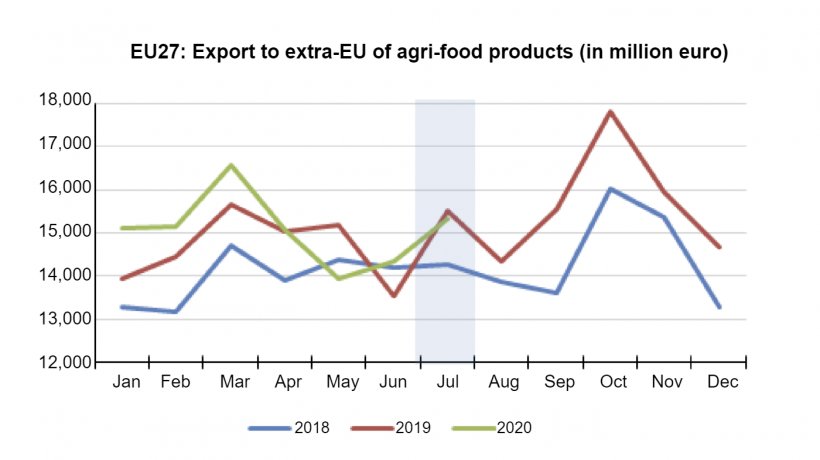During the first seven months of 2020, EU27 agri-food trade (exports plus imports) reached a value of EUR 178.2 billion; 2% more than in January-July 2019. EU27 exports increased by 2.1% compared to the corresponding period in 2019, reaching EUR 105.5 billion. EU27 imports attained EUR 72.6 billion, 1.7% higher than the same seven months period in 2019. The monthly values of EU27 exports have continued to further increase in July (+7% after a 3% rise in June), whereas the monthly value of EU imports have kept further decreasing (-2% after -1% in June) following the downward trend started in April this year.
As a result, the agri-food export surplus during the period January-July 2020 stood at EUR 32.9 billion, an increase by 3% compared to the corresponding period in 2019, despite the Covid-19 crisis. This net trade balance remained boosted by continued strong exports of pig meat, wheat and coarse grains.

Falling exports to the UK mitigated by higher sales to China
On a year over year basis, the highest increases in export values (January-July 2020 compared to January-July 2019) continued to be recorded in trade with China (EUR +2 547 million, +34%). Tripled increase in EU27 export value of pig meat is reflected in the EU27 overall rise in exports of pig meat (The first case of African Swine Fever in Germany was detected in September). Other products with highest gains in export values to China continued to be wheat (+20%), offal meat (+27%), and barley (+106%).
The value of EU27 agri-food exports have increased since January 2020 in Morocco (+368, +35%) and Algeria (+337, +23%) - in both cases driven by increased exports of cereals (mainly wheat).
EU27 export values to the United Kingdom (-359, -1%) continued to steadily decline in comparison to January-July 2019. Sales of live animals have dropped -32%. On the other hand, oilcakes (+55%) and wheat (+90%) reported major exports gains.

Continued strong growth of exports of cereals and pigmeat
Looking at product categories, the increase in export values (January-July 2020 compared to January-July 2019, EUR million) was driven by continued exceptionally high exports of pig meat (+1803, +47% - principally to China); wheat (+1599, +54%) and coarse grains (+454, +36%) following increased availability and strengthened international demand from the neighbourhood countries, but also to Africa and China. Other product categories that displayed solid growth rates include rapeseed and sunflower oils (+325, +20%).
Imports grew 1.7% in value, declining in the United States
Canada saw high imports of rape and colza seeds (+250%), wheat (+56%) and soya beans (+119%). Other major increases included Brazil (+519, +8% - soya beans), and the Russian Federation (+167, +21%- sunflower seeds, oilcakes).
Countries for which EU27 imports decreased most in value terms, include Ukraine (-457, -12%; decline largely driven by falling imports of wheat, but imports of sunflower oil and
oilseeds on rise); and the United States (-451, -7% - mainly driven by reductions in soybeans and oilcake imports). Decreasing imports continued to be also reported for India -253, -15% - other feed and feed ingredients, oilcakes).
Looking at product categories, since the beginning of 2020, the highest increases in import values were reported for oilseeds other than soybeans mainly rapeseed and sunflower seeds (+539, +27%), palm and palm kernel oil (+523, +18%), fatty acids and waxes (+497, +36%). On the other hand, imports of coarse grains (-850, -32%), and oilcakes (-420, -10%) have continued to decrease in value terms.
November 13, 2020/ European Commission/ European Union.
https://ec.europa.eu/




